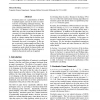179 search results - page 32 / 36 » On Learning Algorithms for Nash Equilibria |
118
Voted
UAI
2000
15 years 3 months ago
2000
Cooperative games are those in which both agents share the same payoff structure. Valuebased reinforcement-learning algorithms, such as variants of Q-learning, have been applied t...
144
Voted
ICC
2007
IEEE
15 years 8 months ago
2007
IEEE
Abstract— We describe a decentralized learning-based activation algorithm for a ZigBee-enabled unattended ground sensor network. Sensor nodes learn to monitor their environment i...
126
click to vote
GECCO
2010
Springer
15 years 6 months ago
2010
Springer
This study proposes a simple computational model of evolutionary learning in organizations informed by genetic algorithms. Agents who interact only with neighboring partners seek ...
130
click to vote
ICML
2000
IEEE
16 years 2 months ago
2000
IEEE
Stochastic games are a generalization of MDPs to multiple agents, and can be used as a framework for investigating multiagent learning. Hu and Wellman (1998) recently proposed a m...
AI
2004
Springer
15 years 1 months ago
2004
Springer
Efficient Learning Equilibrium (ELE) is a natural solution concept for multi-agent encounters with incomplete information. It requires the learning algorithms themselves to be in ...

